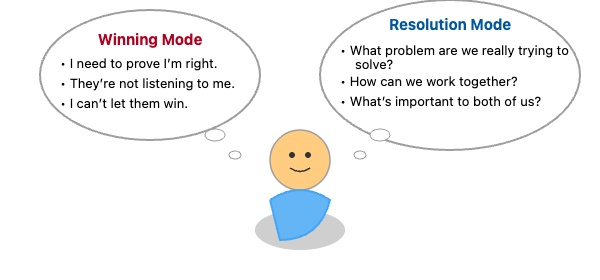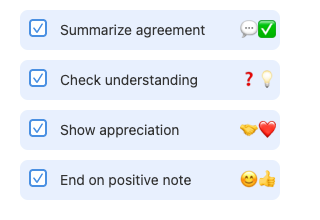When you’re in a conflict, it’s easy to slip into “I have to win” mode. You might feel the urge to prove you’re right, collect evidence, or get the last word. But here’s the thing: if one person “wins” and the other “loses,” nobody really feels good, and the problem usually comes back later. Instead, the real goal is to find a solution that works for everyone and keeps your relationships strong.
Think of conflict like a puzzle you’re solving together, not a battle you have to win. If you notice yourself thinking, “I need to show them they’re wrong,” or “I can’t let them get the upper hand,” pause and ask yourself, “What problem are we actually trying to solve?” This simple question helps you shift from defending your side to working together.
The words you use matter, too. “Winning” language sounds like, “As I already explained…” or “You’re missing the point.” This can make the other person feel shut down. “Resolution” language sounds like, “Help me understand your view,” or “What would a good outcome look like for both of us?” This invites teamwork and makes it easier to find answers that stick.

By the end of this lesson, you’ll know how to spot when you’re slipping into “winning” mode, how to shift your mindset to solving problems together, and how to use language that builds teamwork instead of tension. You’ll be ready to handle conflict in a way that leads to real solutions and stronger relationships.
Even when you disagree, you probably have something in common with the other person. Maybe you both want the group project to go well, everyone to feel less stressed, or for things to just run more smoothly. The key is to look past the argument and figure out what you both actually care about.
Try asking, “What are we both hoping for here?” or “What’s important to each of us?” Sometimes you’ll need to dig a bit. For example, if someone wants to split up the work differently and you want to keep things the way they are, ask why. Maybe they want to make sure everyone gets a fair share, and you want to avoid confusion by sticking to the plan. Now you can work together to find a way that feels fair and clear for everyone.
Listen for words that show what people care about, like “fairness,” “trust,” or “doing a good job.” When you hear these, you’re getting closer to what really matters. Once you find your shared goal, say it out loud: “So we both want to do good work without anyone feeling left out, right?” Getting agreement on this helps everyone feel like they’re on the same side.
When you’re making a plan, use language that keeps things open and easy to adjust: “What if we tried…?” or “How about we test this for a couple of weeks?” This way, it’s not a big deal to change things if they’re not working. You can even write down what you agreed on so everyone remembers.
Here’s how this can sound:
- Jessica: I feel like you keep changing our plans without checking with me, and it’s really frustrating.
- Ryan: I get that, but sometimes I have to adjust things last minute because my schedule changes. I’m not trying to leave you out.
- Jessica: What are we both hoping for here?
- Ryan: I want us to be able to work together without either of us getting stressed out.
- Jessica: And I want to feel included in decisions so I’m not caught off guard. So, we both want to work together smoothly and keep each other in the loop?
- Ryan: Yeah, that sounds right. Maybe we can agree to always text each other before making changes.
- Jessica: That works for me. Let’s try it and see how it goes.
By focusing on what mattered to both of them, Jessica and Ryan turned a personal conflict into a chance to build trust and find a solution together.
How you finish a tough conversation matters a lot. If you leave things unclear, people might walk away confused or upset, and the conflict could pop up again. A strong ending makes sure everyone knows what was decided and feels respected. Here’s a simple framework you can use to close any tough conversation on a positive note:

-
Summarize the Agreement
Say what you both decided:
“So, you’ll do your part and I’ll do mine. Let’s check in soon to see how it’s going.” -
Check Understanding
Make sure you’re both clear:
“What are you taking away from this conversation?” -
Show Appreciation
Thank the other person for working through it with you:
“Thanks for talking this out with me.”
“I appreciate you being honest.” -
End on a Positive Note
Look ahead and keep things open:
“I’m glad we figured this out together. Let’s keep talking if anything else comes up.”
Using this framework helps everyone leave the conversation feeling respected and clear about what happens next. It also makes it easier to handle future disagreements and builds trust between you and the other person.
You have now learned how to shift your mindset from “winning” to solving problems together, how to find what you both really want (even when you disagree), and how to end conversations in a way that leaves everyone feeling respected and clear about what happens next. These skills help you build trust, avoid misunderstandings, and turn tough conversations into chances to work better with others. Next, you’ll get to practice what you’ve learned. In the writing task, you’ll try out these steps by responding to a conflict scenario. Then, in the conversation simulation, you’ll put your skills to the test in a one-on-one role play. This is your chance to see how well you can handle real-life conflict and keep things moving forward!
